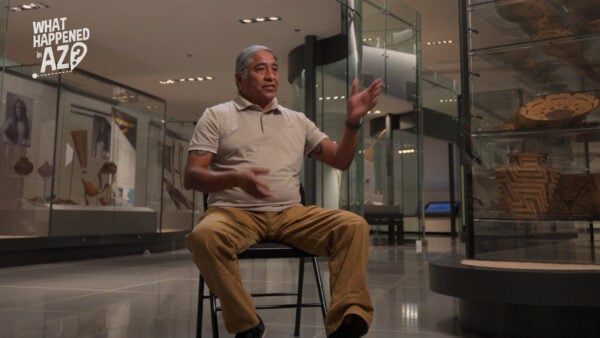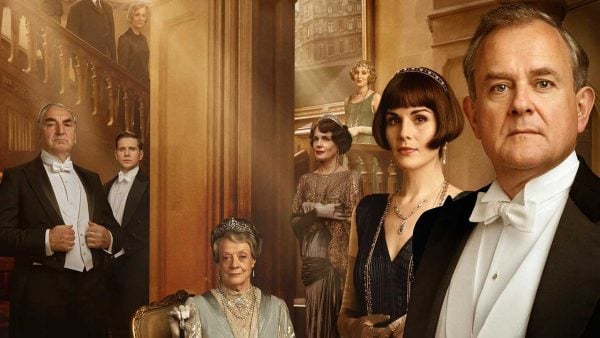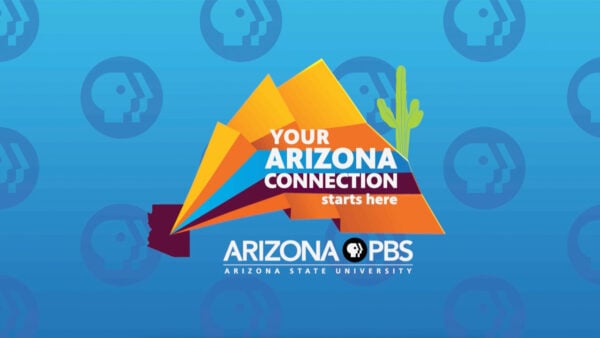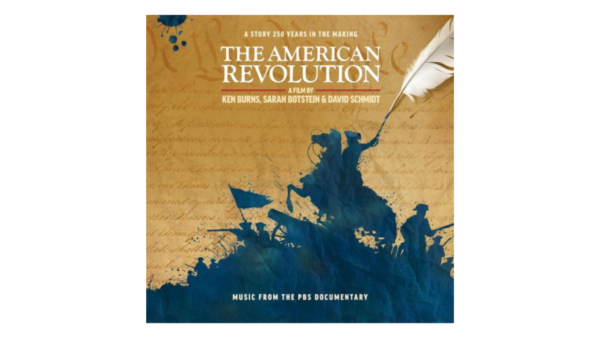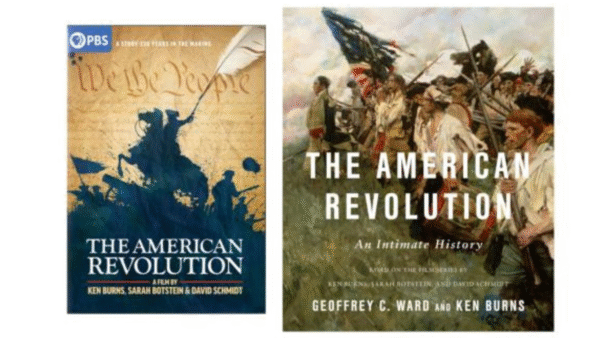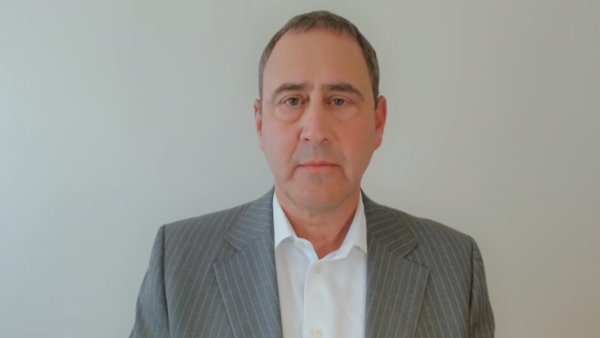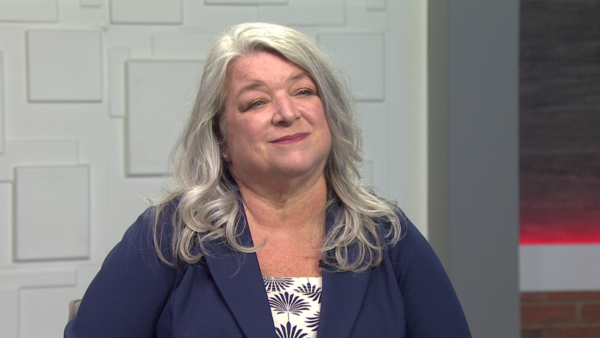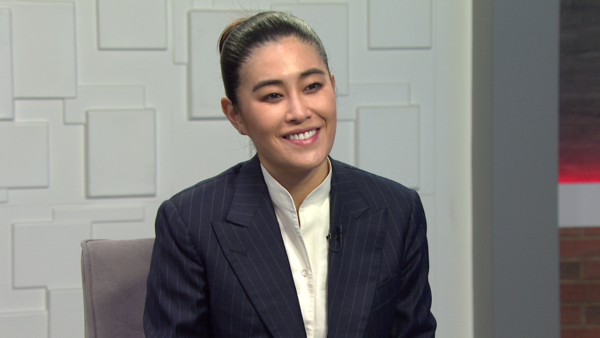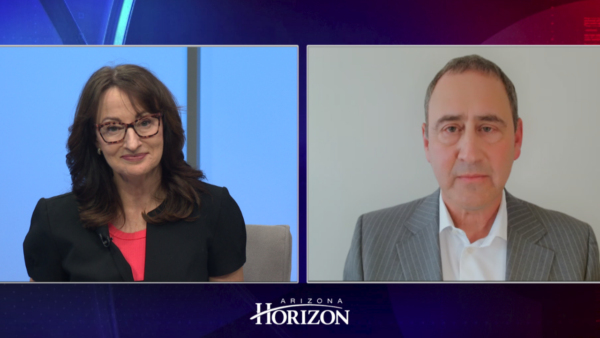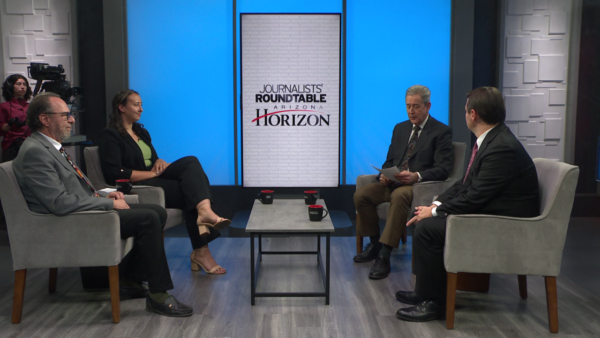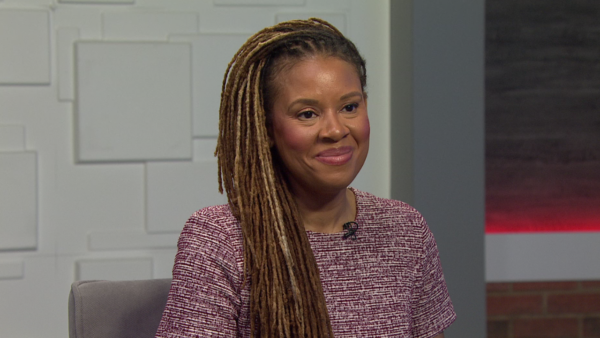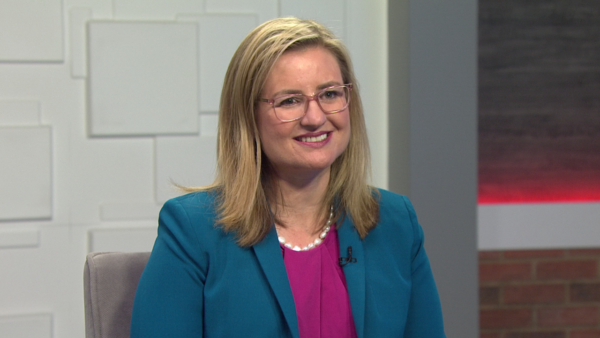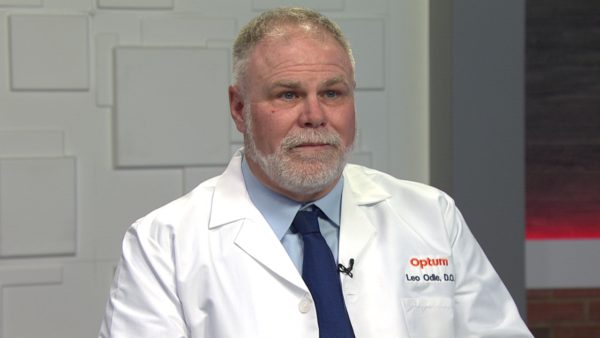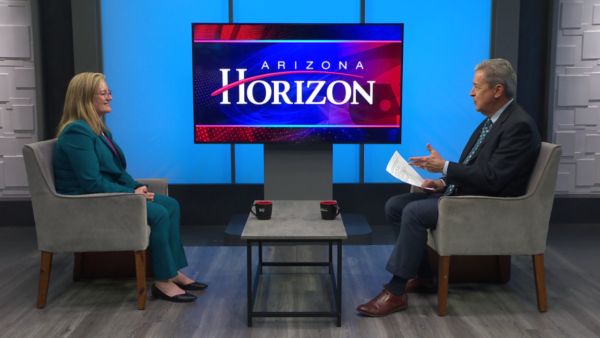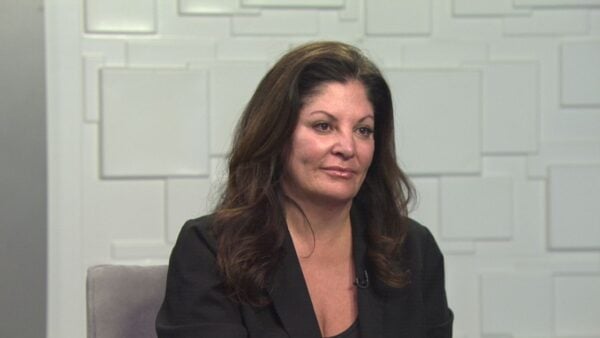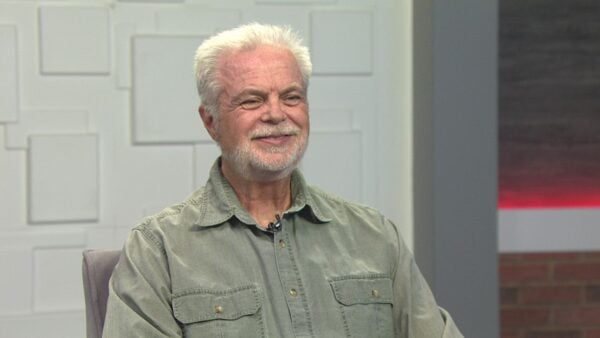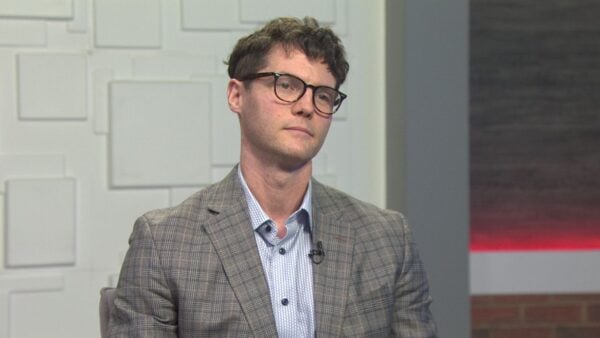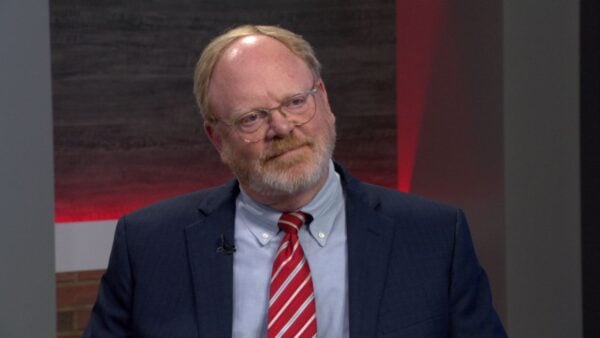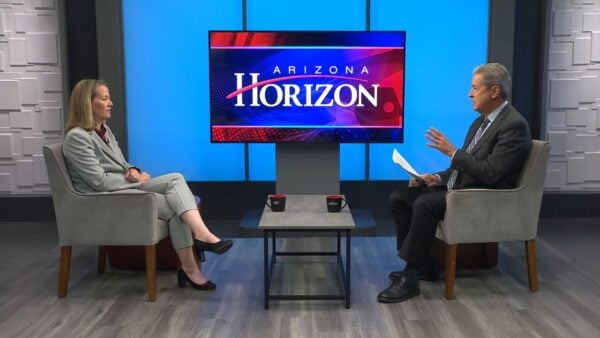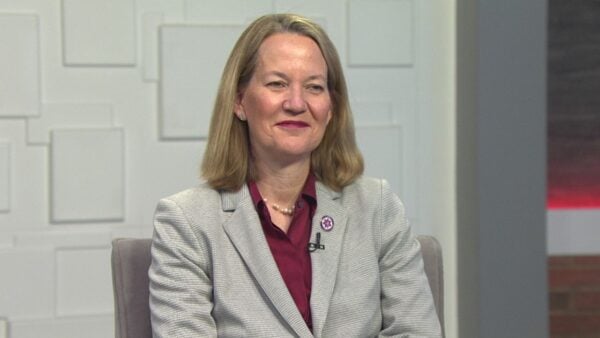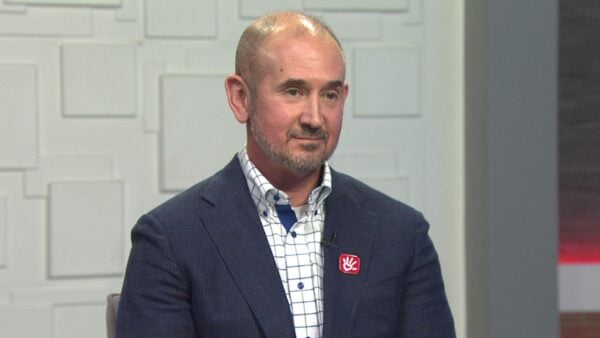With the election just days away, find out who Arizona’s registered voters support in the upcoming presidential election according to the latest Cronkite/Eight Poll. Poll Director Dr. Bruce Merrill and Associate Director Dr. Tara Blanc explain the results.
Read the complete Poll results.
Ted Simons:
>>> Tonight on Horizon we let loose with new numbers on the state of the presidential race in Arizona. Could Senator John McCain lose his home state? And we continue our series "catching up with." tonight a conversation with Arizona's only Hispanic governor. That's next on Horizon.
Ted Simons:
>>> Good evening. Welcome to Horizon. I'm Ted Simons. The crazy ride continues on Wall Street. The Dow Jones industrials jumped nearly 889 points today up about 11%. It was the second biggest one o-day point gain. Analysts say investors jumped on low stock prices and were buying in anticipation of a Federal Reserve fund rates cut. Some disquieting news on the home front. Existing home prices in phoenix have dropped more than anywhere else in the country 30.7%. Las Vegas was just behind at 30.6%. R.L. Brown, who published the Phoenix housing market newsletter, says to expect more price drops to come. Brown says the falling prices will make housing more affordable, eventually stimulating demand. It's taken for granted a presidential candidate will win his home state. That could be in doubt for Arizona senator John McCain. That's according to the latest Cronkite Eight Poll. Our poll shows McCain and Senator Barack Obama in a dead heat here in Arizona. We also asked voters about the county sheriff and county attorney races. The poll of 1019 Arizona voters was conducted October 23rd through the 26th by the Walter Cronkite School of Journalism and Eight/KAET. A margin of error of plus or minus 3%, with the county races having a margin of error of plus or minus 4%. And here to talk about the results is Poll Director Dr. Bruce Merrill and Associate Director Dr. Tara Blanc. Thank you both for joining us.
Bruce Merrill:
>> Good to be here, Ted.
Ted Simons:
>> Let's get to the numbers and the questions you asked and the numbers that I think will raise more than a few eyebrows. We are starting with who are you supporting for president. And this is very close.
Bruce Merrill:
>> It is very close. 46% of all registered voters said that they will vote for McCain. But 44% said they would vote for Obama. The poll has a margin of error plus or minus 3% which means that from a polling point of view all we can say, Ted, is that it's a toss-up. Either one could win Arizona.
Ted Simons:
>> Are you surprised those numbers are so close in McCain's home state?
Bruce Merrill:
>> In a way but keep in mind we live in Arizona, and just because the senator lives here doesn't make us immune from the same trends, the same winds that are blowing across the nation. And I think what's happened is this major meltdown of the economy has really changed the dynamics of the races, not only in other states but in Arizona just as well. So I think that it is awfully close, but on the other hand, that's the trend that the country's going in.
Ted Simons:
>> Awfully close, a dead heat. This thing is too close to call, isn't it?
Tara Blanc:
>> It is. It's too close to call. What's interesting is that McCain was ahead in our poll and other polls by as much as 10 points in August. His support has slipped a little last month down to 7% and again, as Bruce says, it's a dead heat. This is, people are asking a lot of questions about this happening to a candidate in his home state and why. And that's really become a focal point for discussion about what's going to happen in the presidential race and where mistakes were made and where we go from here.
Ted Simons:
>> With this polling data in, is there any indication whatsoever that McCain could get some of this support back in the next week?
Bruce Merrill:
>> I think so, Ted. You have to keep in mind the senator, by choice, of course, has not been in the state. He hasn't campaigned here. He's not running many ads, maybe a few. But that's kind of a risky gamble because Obama has deep pockets. He is running some ads here. He's very well organized here. And I expect that the Democrats may pull in a major democratic national figure and that would give them a real boost and so I think that this is, in every aspect, the possibility of either candidate winning.
Ted Simons:
>> Judging from the trends of this poll and previous polls, the Palin factor, everyone's talking about it. Trying to figure out if it's a plus or minus. From what you see plus or minus?
Bruce Merrill:
>> Tara? Let the women talk first here.
Tara Blanc:
>> Well, what's interesting is, when she was first announced obviously it gave McCain a boost and the purpose of bringing her in was to consolidate the right base of the party, which she did, but there are a lot of people who talked about in many discussions and polls it appears Sarah Palin has lost some of the support from the middle. And we see that in the numbers from McCain. McCain's base had been solidly independent voters. But we have seen in our last couple of polls that the independent voters are actually breaking for Obama. And so I think this is an indication that this, this bringing Sarah Palin in to consolidate this conservative right base has lost some ground for McCain, obviously in the middle. So the question is, he took a risk. How big a risk was it? Is it going to pay off or not?
Ted Simons:
>> In terms of how strong the support is our next question here I believe will be the next, how strong is your support for senator McCain? That's pretty strong. Those who are for him are for him.
Bruce Merrill:
>> That's true of Obama. 95% of roughly both candidates felt that they were very completely committed to vote for this candidate on Election Day. Which means, with a very low undecided vote, Ted, that there's not many people out there that these campaigns are really competing for anymore.
Ted Simons:
>> Let's take a look at the panel, if we could, for the support for Obama and it will show very similar numbers. The undecided vote looked awfully, awfully small. Were you surprised by that?
Bruce Merrill:
>> It's about where it normally is at this point. It's 8, 9%, but at that stage, those people, I don't think, are really even real undecideds. From a polling point of view, when you get to this stage in the campaign, a lot of people will tell a polster they are undecided but they are people who have absolutely no information about even what's going on. So somebody calls, they just say I'm undecided. So my guess is that there's not more than two or three percent of the people who are really undecided and when you throw in how strongly committed they are there's not a lot of wiggle room.
Ted Simons:
>> Who do you think will win the presidency? These numbers I know, Bruce, we will start with you, these are very interesting when you, 20% here at home think he's going to win.
Bruce Merrill:
>> Yeah. I think in many ways, it's one of the more shocking findings of a poll since I've been doing polling. We asked people regardless of who you are voting for, who do you think will win Tuscaloosa? 20% said McCain, 62% said Obama and 18% weren't sure. You can look at it two ways. In some ways that might say there's a lot of loyalty for Senator McCain because -- that many people don't believe that he's going to win and are still voting for him, they're either Republicans or they really like John McCain. But it's almost a shocking finding, frankly.
Ted Simons:
>> Do you agree? This seems awfully surprising that so many people admit I may be voting for a guy that I really don't expect to win.
Tara Blanc:
>> Yes, it was a big surprise to all of us. And it was interesting. I actually did the data entry on this poll. And it was really fascinating to me to see the people who supported McCain and support him very strongly. And yet still said they think that Obama's going to win the race. I think again it speaks to people's loyalty and it talks a lot about political behavior in terms of how people see elections and how they see their role in elections. I mean, you know, why do we vote? What do we think the effect of our vote is going to be? A lot of people I think are going to go ahead and cast their vote for McCain because they believe in what he stands for. He is in line with what they stand for and they want to have a vote whether he wins or not.
Bruce Merrill:
>> Yeah, I do think, Ted, also, this poll does not predict anything. It all depends upon turnout on Election Day. But again, the same trend is happening throughout the country. There's no question that Obama is gaining a lot of strength as we move into this last few days of the election.
Ted Simons:
>> I was going to ask you about turnout. You got strong support for both sides yet you got 20% here at home thinking McCain will eventually win. Historically, what does that suggest as far as turnout? Will we see a depressed GOP turnout if Virginia turns and all this kind of business turns back east? Will we see a depressed Democratic turnout because he's already won, they don't need us anymore?
Bruce Merrill:
>> Well, both of those scenarios unfortunately are possible. But what we do know is that we're predicting maybe the highest turnout in the history of Arizona, maybe 85% turnout. The higher the turnout in general, the more you will bring in Democrats that will vote in the process. So I think that's going to be the key thing, not only in the presidential race, but that high turnout could affect congressional races, legislative races, throughout the state.
Ted Simons:
>> A last question remarked the presidential race involves negative campaigning and who folks thought was running the more negative campaign. Is this a factor at all on any of the previous numbers we have seen, do you think?
Tara Blanc:
>> Well, I think that it has probably affected again how people look at candidates. I mean, it was clear two to one people thought McCain was running a more negative campaign than Obama so in terms of people getting involved and deciding who to cast their vote for, these -- one of the things that we know, for example, on for people who are undecided, that they are looking more for somebody to give them information about. They want to hear from what the candidate is going to do for them rather than hearing the other candidate attack-- the candidates attack each other. So especially in the last few weeks of the election, when all of the focus is on these undecided voters, negative campaigning becomes a problem because this does not turn on an undecided voter. It will turn them off.
Ted Simons:
>> But don't folks often say they don't like negative ads, they can't stand negative ads and the doggone things work every time?
Bruce Merrill:
>> That's why they do them. We can rail against them but people use them because they are effective. And I think Tara's analysis was a good one. I would add one other small factor and that's that we have some evidence that attack ads turn off independents, and that's really going to be the group, I think, that's going to determine the outcome of this election. A third of the electorate in Arizona is now independent. And it's growing nationwide. So it's a very important voting group.
Ted Simons:
>> Ok. Let's get to some things that are away from the presidential campaign. We have got some -- one proposition I guess you looked at Prop 105 where the majority of registered voters as opposed to the majority of voters who vote, and it doesn't look like anyone's buying this. I mean, talk to me about these numbers.
Tara Blanc:
>> Well, that's the sense that we got, that the most -- not most of but obviously the majority of the people that we talked to understand what this proposition would do, and don't seem to like it. They don't like the idea that their voice will not be heard just simply because somebody else decides to sit home. And so that's what we got from the people we talked to that there was resistance to this idea that just by staying home somebody can take away my choice. And so I think that's why we're seeing more people who are against it than are for it.
Ted Simons:
>> Let's keep it moving here. Financial crisis. You asked about that as well and how much this is affecting you and your family and it looks like, what, 75% of folks saying it's hurting.
Bruce Merrill:
>> Yes. And a third saying it's hurting them a lot and the most interesting thing is when I cross-tabulated those numbers with who people were voting for, when you take the people that are hurting a great deal, it's almost two to one Obama. So there's no doubt that this crisis is having a very severe effect on the election.
Ted Simons:
>> And again, that's something that would be difficult for McCain to campaign against. I mean, it's there. You got to fight it and it's not turning out so well for him so far.
Bruce Merrill:
>> That's a good point. In fairness to the senator, I'm not sure what anybody in that situation could do. I mean, the national polls and our polls show most people blame the Republicans for this. Most people feel Obama is better qualified to bring us out of this. I'm not sure what he could have done. He was almost, his candidacy occurred almost at the wrong time.
Ted Simons:
>> Let's get to county races. I know a lot of folks are interested in the sheriff's race and the county attorney race. We will start with the sheriff. Sheriff Joe Arpaio and son of a gun, there he is, Bruce, can you explain it?
Bruce Merrill:
>> Sure. Sheriff Joe is a celebrity in Arizona. He's been in long time. Everybody -- he has almost -- everybody knows who he is. He has no -- not anybody doesn't know who this guy is in Arizona. And the more he rails against violence and crime and cracking down on illegal immigrants the more people like him. So these numbers aren't going to change too much. People have liked him for a long time and they continue to like him.
Ted Simons:
>> Are these numbers similar to what we've seen from previous sheriffs' elections involving Arpaio?
Bruce Merrill:
>> Yes, yes. He's always done quite well in Arizona. And I think a lot could happen depending on the turnout. But he goes into this race with a big lead.
Ted Simons:
>> Does that suggest to you that he could have been, if he wanted to in previous elections, a pretty strong statewide candidate? Or is it just really strong in the county?
Bruce Merrill:
>> I personally feel that what will have limited Joe to run statewide is he's identified with such a narrow range of issues, primarily crime and violence and illegal immigration. And he would have had to demonstrate to the people that he understands everything from education to the environment, et cetera. So we really won't know that obviously.
Ted Simons:
>> OK. Tara, we have got the county attorney's race as well. This one a little closer and in some respects a lot closer between Andrew Thomas and Tim Nelson. Talk to us about these numbers.
Tara Blanc:
>> Well, actually in this race, the two candidates are in a statistical dead heat when you take into account statistical error. It's interesting, as Bruce pointed out, Sheriff Arpaio is a celebrity. People know who he is. They identify with him. Andrew Thomas is -- we have found, we have asked the question in previous polls. He is not as well known. If you look at the undecided percent in this election, 21%, I think, and I suspect much goes back to the fact people are not familiar enough with Thomas. And so the fact that this race is so close I suspect speaks of much to the general trend against Republicans as it does anything else. Because people are looking at county level problems, state level problems, we are seeing it in the state races, for example, that the democrats are making gains in lots of places. And I think this is one of those races where we are seeing that happen. Regardless of how familiar people are with the two candidates if they don't know them, and they have got this thing that in their minds the republicans have caused problems they might go with the Democratic candidate.
Ted Simons:
>> Yeah, you kind of wonder with so many undecideds, you wonder how it will fall. We have a couple of minutes left. I want to ask you about polling in general, procedures. We hear about cell phones. We hear about the Bradley effect. How much is at play now?
Bruce Merrill:
>> They are big factors in polling. Even bigger, though, Ted, you have to keep in mind that polls only measure public opinion at a particular moment in time. And we live because of mass communication at a time where the electorate is very volatile. Something happens, it can change a poll and make it outdated in a day. In addition the cell phone thing is a real problem. 15 to 20% of people now are using their cell phones as their major line. And we know that most of those people are very young. And the young people, for instance in this election, are supporting Obama almost two to one. So if there's a bias in the polls because of cell phone use, it actually would underestimate Obama's support by a couple percentage points.
Ted Simons:
>> About a minute left. Is there a Bradley effect? People say that they will vote for an African-American candidate but really eventually don't? Is there a reverse Bradley effect where folks that don't think they could ever vote for an African-American candidate wind up voting?
Bruce Merrill:
>> Both of those are true. I think there are people in the privacy of a voting booth will not vote for an African-American. Racism is still a problem in this country. But I think there may be a reverse Bradley effect. What we mean by that is simply that a lot of Republicans with Obama doing so well may want to join that band wagon but aren't going to tell their Republican friends or pollster they are going to vote for Obama.
Ted Simons:
>> These are fascinating numbers and I am sure people will be using these in polite and not so polite conversation in the coming week. Thank you for joining us.
Bruce Merrill:
>> The only poll that counts is Election Day.
Ted Simons:
>> That's right. And by then your job is over with. Thank you very much.
Ted Simons:
>>> Coming up we will be catching up with Raul Castro but first, with the election just a week away, here's how to become a better informed voter. To get to our vote 2008 Web site go to azpbs.org. When you get there click on vote 2008. That will take you to our vote 2008 home page. There you will find information on local and state elections and national elections. In the state section you can find information on propositions. You can also check out elections debates from districts. Don't know which legislative or congressional district you live in? You can find that out, too. In our on demand section you can view past horizon shows on the propositions or candidate debates. Also you can download a podcast or check out who holds the lead in the presidential race in Arizona by checking out the Cronkite Eight Poll. Find out about upcoming election coverage on Horizon by going to our TV schedule. Voting on the propositions can be complicated but you can be prepared with "my ballot" where you go into the voting booth. After studying the propositions on our site, click to mark your vote and then print out the page and take it with you when you go to vote. If you want information from a national standpoint, we have a wealth of resources. You can check out the Jim Lehrer NewsHour site. Explore the PBS vote 2008 site. Get analysis from numerous blogs. Look at an election map. Learn about candidates' stances on issues through what's at stake. Plan out your very own national budget in a fun, colorful way through budget hero. Of course, our political links are unparalleled. So spend some time on our Vote 2008 site and become a very well-informed voter.
Ted Simons:
>>> Tonight we continue our four-part series on noteworthy Arizonans who were once in the political arena. We call it "catching up with." tonight we bring you up to date with former governor Raul Castro, the only Hispanic elected to Arizona's top office. Nadine Arroyo Rodriguez tells us about Governor Castro's career, his experiences, and who he shares those memories with today.
Teacher:
>> Girls and boys, I would like to introduce the Honorable governor Raul Castro. [Applause]
Raul Castro:
>> I have been a prosecutor for 10 years, a judge in Superior Court for many years. Governor of the state of Arizona, and a diplomat for 14 years in Latin America and people ask me invariably, about all those jobs, what job do you like the most? I tell you what I do, I'm retired and I spent 60% of my time going to elementary schools, talking to fourth, fifth and sixth graders.
Nadine Arroyo Rodriguez:
>> Raul H. Castro was born in Mexico in 1916 to Mexican-born parents. Francisco Castro, a union supporter and Rosario Castro, a midwife. Castro endured much discrimination in his youth.
Raul Castro:
>> I used to go, my mother would take me by my hand and go to the town on the Mexican side to buy mate and tortillas because they were cheaper. On the way back from Mexico, to the United States, a man in uniform, immigration man would ask my mother -- [speaking in Spanish] madam, where were you born? My mother would reply Santa Rosaria, Mexico. You could see the inspector sort of raise his eyebrows and he would ask -- what was the child born? And I would reply, Sonora, New Mexico. This made the inspector in my mind the ugly. His tone of voice change. He was not friendly. Sort of a sense of hostility. Who would leave the border, I would ask my mother, mother, why was that man angry at us? The moment we said we were born in Mexico, he wasn't very friendly. As most mothers would say, that don't want children to have ill feelings toward anybody, mother would say, "son, Mexico is one country. The United States is another country. They want to be sure we are not violating the American immigration laws." The Mexican children, we walked to Douglas five miles. The buses from Douglas would pick up the white children, the Anglo children and gave them a ride to schools in Douglas. The bus would pass us walking to Douglas. The children on the bus would wave at us. They would ride and we would walk. And again as a child your age, I would ask, this is not right. This is not fair. These right things in my life that made me push forward.
Nadine Arroyo Rodriguez:
>> In 1964, President Lyndon B. Johnson appointed Castro to U.S. ambassador of El Salvador, followed by a second appointment as Ambassador of Bolivia. In 1974, Raul Castro made history when he was elected the first Latino governor of Arizona. And to this date he has been the only Hispanic to serve in that capacity. But he didn't complete his four-year term. In 1977, President Jimmy Carter appointed Castro Ambassador to Argentina. He continues to travel, attend speaking engagements and share his opinions about current affairs and people.
Raul Castro:
>> I like to motivate young people. I like to walk in the classroom, look at children, look at their eyes and let them see and look and don't tell me that you don't have a chance. You could have a chance. You must get an education. You must go to school. I don't care if you are Scandinavian, Norwegian or Swede. If you go to school, if I was able to do it so can you but you have got to get your education. And this is the time I enjoy the most, working with the young people.
Ted Simons:
>> Tomorrow on Horizon we continue our series, "catching up with," by giving you the latest on former Phoenix Councilman Calvin Goode. That's Wednesday at 7:00 on Horizon. That is it for now. I'm Ted Simons. Thank you so much for joining us. You have a great evening.
Announcer:
>> If you have comments about Horizon, please contact us at the addresses listed on your screen. Your name and comments may be used on a future edition of Horizon.
Dr. Bruce Merrill:Cronkite Eight Poll Director;Dr. Tara Blanc:Cronkite Eight Associate Poll Director;

